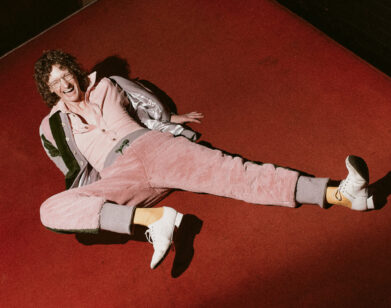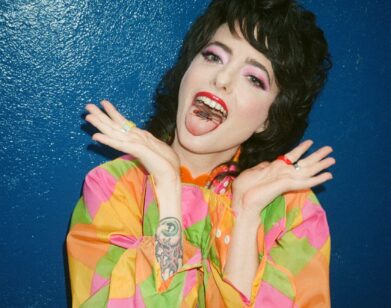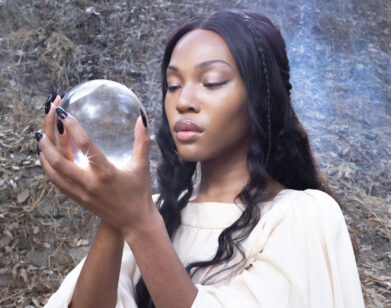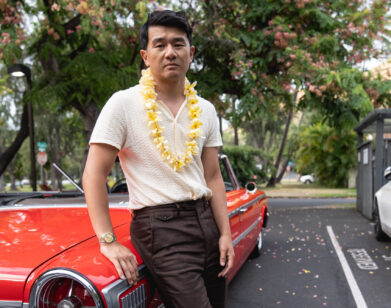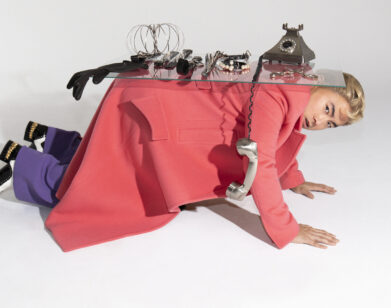going through changes
Nick Kroll and Seth Rogen Trade Summer Camp Horror Stories
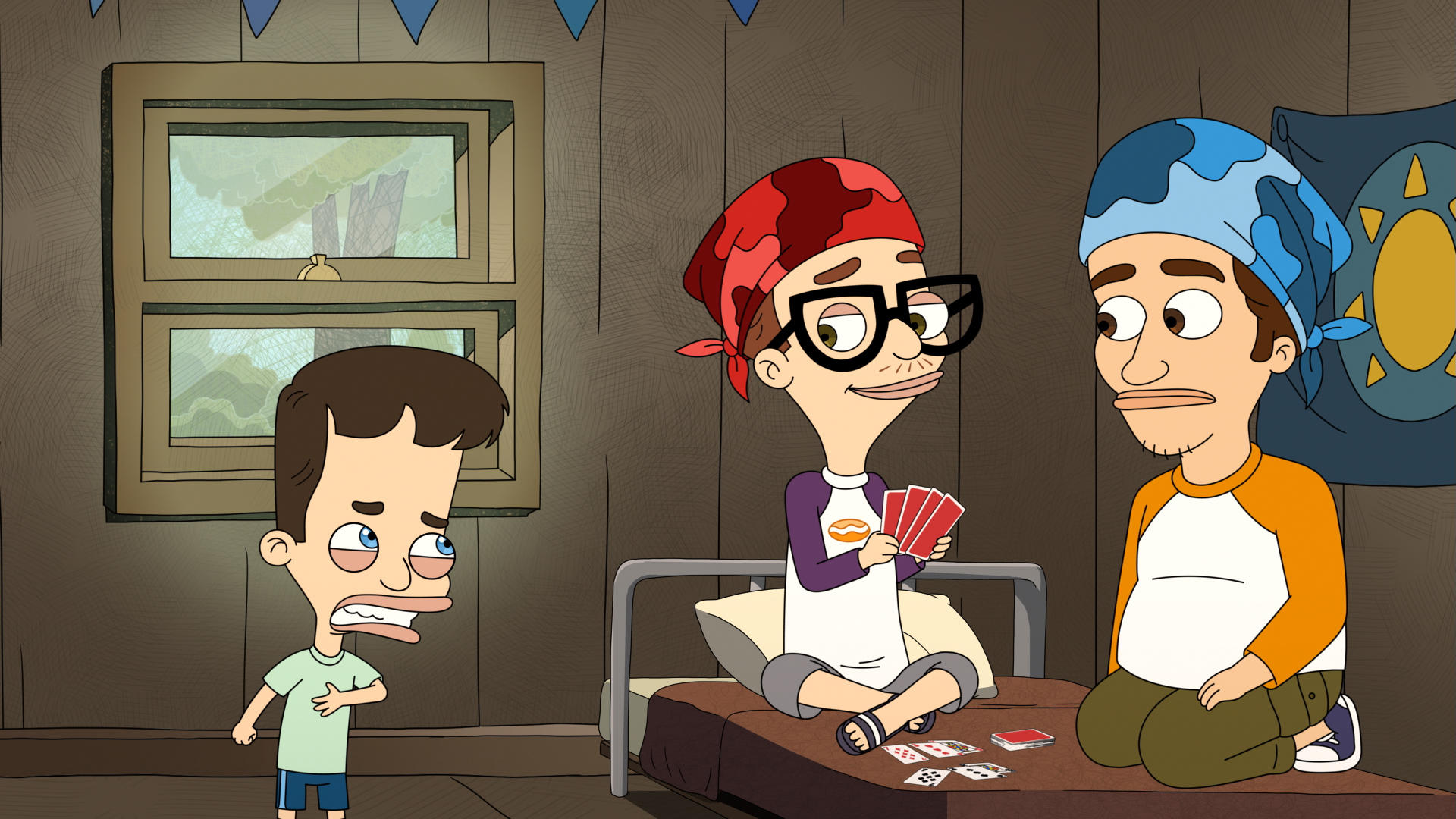
Nick Kroll as Nick Birch, John Mulaney as Andrew Glouberman, and Seth Rogan as Seth Goldberg in Big Mouth. Image courtesy Netflix.
The last time Nick Kroll and Seth Rogen worked together was on Rogen’s film Sausage Party, in which Kroll played a douche. Yes, an actual douche. (“I sucked a juice box’s dick, and I’m shoved up a god’s asshole, and this is the weirdest thing that I’ve done so far, bro!” is a real quote from the animated, R-rated supermarket-set fantasia in which hot dogs copulate and bagels war with lavash.) It was inevitable that Rogen, four years after the release of Sausage Party, would reunite with Kroll, who honed his skills as a multi-character chameleon on The Kroll Show, to voice a character on his own raunchy animation project, Big Mouth. It’s perhaps more inevitable that Rogen’s would be the bawdy camp friend. The show, which Kroll created with his real-life childhood best friend, the writer Andrew Goldberg, is the semi-autobiographical account of their anxiety-ridden pubescence. Big Mouth is at once shamelessly vulgar and emotionally complex; amidst the surreal bathroom humor—Kristin Wiig voices a Girlboss-y vagina, Jon Hamm stomach ache-inducing scallops—there lie very real tales of innocence lost. Both Kroll and Rogen are products of the Jewish summer camp experience, and it’s summer camp where we find our characters at the onset of Big Mouth‘s upcoming fourth season. With all its grime and anxiety—group showers, periods in the lake, sloppy makeouts in the woods—it’s the ideal setting for Kroll to deepen his comedic voice. With a joint in hand, Rogen got on a Zoom call with Kroll to take a harrowing trip down Jewish summer camp memory lane. —SARAH NECHAMKIN
———
SETH ROGEN: Let’s talk about your show, Nick. It’s exciting.
NICK KROLL: Let’s do it.
ROGEN: It’s coming out now. It was going to come out earlier, but now it’s coming out now.
KROLL: It is indeed. It’s so funny envisioning this conversation in print because I’ve read these stories before. I’m always like, “Oh, they both sound like Hollywood assholes who are trying to seem humble and fans of one another.”
ROGEN: Yeah, exactly. That is what we are, though.
KROLL: We are, at the very least, fans of one another.
ROGEN: It’s the parenthetical laughs that kill me every time. Interview magazine, don’t feel a need to put parenthetical laughs after every fucking sentence I say. People get it. They know I laugh a lot. It’s fine. [Laughs]
KROLL: Let’s say it’s a given in the Seth Rogen milieu to be laughing.
ROGEN: Let it be said from this point forth that every sentence is followed by parenthetical laughs. We’ll save the ink.
KROLL: Is this going in the magazine?
SARAH NECHAMKIN: No. This is online.
KROLL: That’s what I thought.
ROGEN: When Beyoncé is interviewing Lady Gaga, it gets in the magazine. When I’m interviewing you, they’re like, “We’ll tweet it out.”
KROLL: It’s like, “We have to save space in the magazine for Andy Warhol’s dog walker and Lou Reed’s leather distributor.” So Seth, let’s start with the fact that you’re on the show this season. One of the things that I really like about you, beyond the fact that you’re a nice, funny guy who laughs at the end of most sentences, is you’re not afraid to be a fan of others. There’s no status play with you of withholding your liking of something.
ROGEN: No, not at all. I very much like things. I remember seeing a documentary about SNL a really long time ago, and one of the writers was like, “Yeah, I don’t laugh at other people’s bits because I don’t want them to think that they’re funny.” I remember thinking, “That’s a terrible way to approach things.” I’ve always told you how much I like your show. I essentially asked you to put me on it.
KROLL: But that only works when people also find you funny and talented.
ROGEN: Exactly. Paul Thomas Anderson has yet to take me up on it.
KROLL: It’s coming. I can feel it. I played soccer with PTA in a pick-up soccer game, and I thought that would maybe get me in one of his movies, and then still no. But he’s a lovely guy and a great soccer player.
ROGEN: Well, put in a good word for me, Nick. But yeah, I’ve always been unafraid to put myself out there. It’s the only way I’ve ever had any success in my entire life, by asking people explicitly to put me in things. I’ve learned that they’re probably not going to ask and so I should just do it myself.
KROLL: It’s a combination of insecurity and ego.
ROGEN: Yes, exactly. Like most things I do.
KROLL: Your role on the show is based on someone I and Andrew Goldberg, who co-created the show with me, knew. We really did go to camp together. We went to a Jewish—and for interviewmagazine.com, it’s J-E-W dash I-S-H. It was 90 percent Jews, but it wasn’t a Jewish camp. Did you go to a Jewish camp?
ROGEN: I went to a Labor Zionist camp.
KROLL: Amazing.
ROGEN: It was called Habonim Dror. Yes, I went to a radically left-wing Jewish summer camp. It was so left-wing Jewish that I think also there were not only Jewish people there because that would be against their very liberal values.
KROLL: And to top it off, let’s not forget that it’s a Canadian Zionist Jewish labor summer camp.
ROGEN: Yes. My summer camp didn’t have a lake or boats or water skiing or anything like that. We were just in the woods.
KROLL: You were in the woods reading Marx and David Ben-Gurion?
ROGEN: Essentially. I loved summer camp. It was very developmental for me. Every evolution in my adult behavior came from my peers at summer camp.
KROLL: Do you remember the Jerky Boys? I heard the Jerky Boys for the first time at summer camp on a cassette tape. It was the first viral thing that I ever experienced.
ROGEN: For me, it was the Adam Sandler audio album. We listened to that all the time. The first time I heard Wu-Tang was at summer camp. I remember Saul Moskovitch had a tape of Wu-Tang.
KROLL: Yeah. I remember it was RZA, GZA, Saul Moskovitch.
ROGEN: Exactly. You went to summer camp with the person you created the show with, so did the show tap into things that happened at summer camp?
KROLL: Yes, it did. You and I both have our Goldberg.
ROGEN: The key to every good and successful comedy actor is a Goldberg in the past. I met [Evan Goldberg] in Bar Mitzvah class and we started writing together and have been writing together ever since.
KROLL: Every writer/performer needs his best friend Goldberg.
ROGEN: It’s ancient Jewish lore that you get assigned the Goldberg.
KROLL: Thou shall not covet thy neighbor’s wife; thou shalt have a Goldberg to write and be behind the camera for.
ROGEN: In pursuit of a righteous punchline. Did you write with him before this show?
KROLL: No, we met in first grade. We became best friends in middle school. He then came to camp with me. I had gone to this camp called Wildwood prior to him and then he joined me around seventh grade, and it kind of follows that in the show. My mom didn’t want us to be in the same bunk because she wanted some separation, and then he slowly became best friends with my camp best friend, this guy Danny Mishkin, who is very pleased that you are representing him in the show. Danny Mishkin now runs a summer surfing camp for Jewish kids called Sababa. They eventually, over many years, became best friends and I felt on the outside of that. We condensed that storyline with you, because we named your character Seth Goldberg as an homage to Andrew and Evan Goldberg. A lot of the stuff that happens in this show is what I felt, because I was a late bloomer. Group showers were a nightmare.
ROGEN: Oh, yes! We had group showers at our camp. It was on an island called Gabriola Island that’s off the coast of British Columbia, and there was perpetually a water shortage. Because of that, we would shower once or twice a week and it would be everyone in a small room together, like on the show.
KROLL: “Hey, Jewish kids. We’re going to pack you in a small shower all at once once a week. Then, if gas comes out, it’s because of a water shortage.”
ROGEN: The Jewish camp shower jokes were plentiful. You didn’t want to be the kid in the bathing suit, because at the end of the day, you were just in a room with everyone’s dicks out and that was a truly harrowing thing.
KROLL: It was. I got very good at facing the shower and then cranking the neck around to say something mean to someone to hopefully deflect, because then there were the kids who had acne on their backs and butt.
ROGEN: I was, thank god, right in the middle. I was not the kid in the bathing suit in the shower, but I also remember one or two kids had full-on mad dicks when we were 11-years-old and it was like, “That’s not a bush. It’s like a full-on maybe giant dick.” That was just as alarming for a lot of us.
KROLL: Was it, for that kid? Or is that kid now the president of Canada?
ROGEN: It goes either way. Adam Sandler had a joke about how guys with giant dicks become unsuccessful because ultimately, they don’t need to do much. It ruins your ambition. You lose that edge.
KROLL: That makes sense. Looking back, the people they had counselor-ing us were 19. I wouldn’t leave an unplugged microwave with a 19-year-old, let alone my child.
ROGEN: It’s like entrusting a cat to a ferret. Our counselors were 17 and the campers were 15. The oldest person at the whole camp was 18.
KROLL: It was crazy. I remember this one kid got lice, and they showered him with a special shampoo. The counselor gave him the shampoo and they didn’t read the instructions that say that you have to keep your eyes closed, so—I don’t know who shampoos with their eyes open—but the lice shampoo got in his eyes and he was ostensibly blind for about two weeks and had to wear BluBlockers. And this kid was already kind of not the coolest kid. There’s a character in our show that we call Milk, and Milk is the kid. There was always that kid who everybody could make fun of.
ROGEN: We had that kid as well. I will not say his name in case he’s a huge reader of Interview, but he wore a bathing suit in the shower, as well.
KROLL: This same kid woke up to two kids jerking off on him one day. Kids are bad at school in middle school, but at camp, the worst of them comes out.
ROGEN: Yeah. This kid, we’ll call him patient zero or whatever. I remember one night, we put his hand in warm water, hoping he would pee, but he did not pee. And then, what we did was just take the warm water and dump it all over his crotch and woke him up and told him that he pissed himself, which he believed because he had no reason not to, and it was actually much more tormenting.
KROLL: Looking back, we were torturing each other, but I will say, Andrew and I were best friends at camp and some of our earliest performing was campfires and skits. We would play Wayne and Garth from Wayne’s World and we did a lip sync to Queen’s “Don’t Stop Me Now.” We did it in spandex with teddy bears taped over our crotches, shirtless, running around the camp. Now, looking back, it was very homoerotic.
ROGEN: All of summer camp is.
KROLL: Very. We won the lip sync competition, and usually the winners would then perform at parents’ visiting day, but they did not want us performing. I can’t believe that got cut out of Bohemian Rhapsody.
ROGEN: I know. Freddie Mercury was always a fan, and he was happy that happened, I always heard.
KROLL: Yeah. He loved it. They showed him a VHS as he was passing away. Was your camp co-ed?
ROGEN: Of course.
KROLL: Did you get any action at camp?
ROGEN: Yeah. The first time I did almost anything ever subsequently over the years was at summer camp on the migrash sport, the sport field, as we called it.
KROLL: Sure, sure.
ROGEN: I think Jewish summer camp in general is to make young Jewish people breed with one another, so that is the intended result. Our camp literally had a thing called the Love Shack, which was a wooden shack with mattresses on the floor that you could go hook up in.
KROLL: Really?
ROGEN: It said the Love Shack on the side of it. It was painted on there. I think I did hook up in the Love Shack once, and it was gross. Hormones were flying, you know?
KROLL: I went to an all-boys camp, and so we had socials, but I was never good at a social. My success over the years with ladies was always much more long game. To get to know how funny I was or whatever for me to eventually convince you to decide, against your better judgment, to stop being friends with me and to start making out.
ROGEN: I imagine boys summer camp was the most disgusting thing in the entire world. I think the presence of the opposite sex is the only thing that stopped us from completely delving into a disgusting world.
KROLL: Yeah.
ROGEN: Our camp had a pee wall instead of urinals. As a joke, what we would always do is when someone was peeing on the pee wall, someone would literally come up from behind and push them as hard as they could against the pee wall and they would pee all over themselves. That was a regular occurrence. I think that’s assault.
KROLL: Did you ever go on a teen tour to Israel?
ROGEN: Yes. It was the summer before I got cast in Freaks and Geeks.
KROLL: I did that teen tour thing as well in Israel with Andrew Goldberg and Danny Mishkin and that was really the crux of when they became better friends with each other than they were with me.
ROGEN: Nick, start promoting the show. What were the conversations you guys had leading into the season? What were the themes you wanted to explore? You added anxiety as a character.
KROLL: I think it was Andrew’s idea. Before a season starts, we’ll kind of think about an overall theme. Season two of the show was a deep dive into shame, and so season four, we came up with the idea of anxiety, both because that age is a very anxious age because everything’s changing and you don’t quite understand what’s happening to you and you’re trying to figure out if you’re a weirdo, and then, on top of that, kids today feel, I think, much more anxiety than we felt when we were that age. I think screens and social media and everything is playing into that. I would put a lot of money on the fact that, if you asked your average person right now, “Do you feel more anxious now than you did five years ago, 10 years ago, 20 years ago,” they would say, “Yes.” Of course, we started writing and voicing all this well before COVID hit. We just knew that there would be an election coming out right around when the show was coming out.
ROGEN: Hopefully.
KROLL: We figured somewhat correctly that there was going to be some heightened anxiety. We started to figure out what that would be and eventually landed on Tito, the Anxiety Mosquito, and got Maria Bamford to voice the part, who’s the perfect voice for anxiousness. Once we decided on summer camp, we thought it would be a good place to launch all the anxiety, because summer camp, for someone like me who hadn’t hit puberty at a time when everyone was sort of going through it, was anxiety-ridden. In the case of our other characters like Jessi, voiced by Jessi Klein, it was getting her period—not only getting her period but getting the biggest period ever. It’s scary enough on its own, but when you’re at camp, sleeping in a bunk with a bunch of other people, that would be completely anxiety-ridden.
ROGEN: You don’t want a big period? That’s not a status thing?
KROLL: No. I don’t think it is for the ladies.
ROGEN: I should take back some compliments I’ve been giving over the years.
KROLL: We also introduce this character Natalie, who’s a trans girl who had been in previous years at the camp as a boy, and that obviously would bring its own levels of anxiety in general, but specifically in a camp environment. It felt like a good place to begin to introduce all that stuff. Also, John Oliver plays the camp counselor. Did you guys have British counselors at your camp?
ROGEN: No. We had some Israeli ones every once in a while.
KROLL: I bet. For some reason, all the camps in Maine had British imports. It was a way, I think, for Brits to get visas to come and hang out in the U.S. They all wore short shorts and black socks and sandals.
ROGEN: Do you want to talk about aging your character? I just watched the episode where they go to the future.
KROLL: Where they see Nick Starr, who is, I guess, some version of myself. I don’t know if you’ve ever had this, where what you’re writing is starting to affect your real life. In this case, I was writing about Nick Birch’s fears of becoming Nick Starr, who is a mid-40s person in show business who’s incapable of commitment and intimacy. And I was, at the time, with my now … When is this coming out?
NECHAMKIN: Next week.
KROLL: I got married, by the way.
ROGEN: Mazel tov!
KROLL: Thank you. But it was at this moment in my relationship where I was deciding whether I was going to kind of dive in or bail. Like, how much do I want to allow someone in, surrender to the relationship, and surrender to intimacy? And so I’d go in the room and talk about this story of Nick Starr and whether he’s going to open up and be intimate with someone or is he going to protect himself, and then I break from the room and go into my office and have a fight with my then-girlfriend about—at that moment, we were long-distance—whether we were going to dive in or not. And it was so fucking stressful, but I will say, now, basically two years later…
ROGEN: You did the other thing.
KROLL: I did the other thing. I chose to walk towards love and not be afraid of intimacy because I didn’t want to become Nick Starr. I didn’t want to be alone. You’ve been with Lauren [Miller] for years.
ROGEN: 15 years.
KROLL: Wow!
ROGEN: Honestly, the movie Neighbors is probably the most reflective of my actual relationship. I’ve never been able to reflect my relationship in an interesting way, really, because there’s very little conflict in it. We met really young and we essentially moved in with each other a week after we met and we’ve kind of just been together ever since. And so, that was never really an issue for me, but you were just writing what you were going through.
KROLL: I was, and it was ultimately incredibly cathartic—well, cathartic, no, it was not. But it was therapeutic in some way in that I was literally figuring out my anxiety about both being alone and my anxiety about opening up and being intimate and vulnerable, and then allowing a writer’s room to weigh in on that. It wasn’t just me writing my solo one-man show. It was, I come back from having a fight or a hard conversation with my girlfriend and then they’d be like, “Well, we’ve been breaking this story and we think that Nick Starr is happy to be alone,” or whatever. I’m like, “Okay.” “Nick Starr sabotages his relationships and can’t figure out how to finish his season.”
ROGEN: It’s nice that that happened and it’s very entertaining as a result.
KROLL: Good. What if you’re like, “Oh, buddy. Not worth it.”
ROGEN: If it wasn’t entertaining, then none of that would matter.
KROLL: Isn’t that a bummer when you pour your heart and soul into this thing and people don’t like it?
ROGEN: Yeah. I’ve come to the conclusion that I have a lot of traits that people don’t like and when I put myself on display, even people who are close to me don’t like it sometimes. Someone like my wife will listen to an interview I did and she’ll just be like, “You sound like such an idiot.” And I’m like, “I’m trying to be funny.” She’s just like, “Yeah. Well, you sound stupid.”
KROLL: That’s weird because I’ve listened to your interviews and I find you refreshingly open in them. I think as a fellow person who’s been interviewed, I like that you’re comfortable enough to say, “Here’s my shittiness,” or, “Here’s my, whatever it is.” You seem to not give a shit.
ROGEN: I’ve been told I should more than I do by those very close to me. So, we’ll see if it happens.
KROLL: I find myself now more than ever erring on the side of being a good boy in interviews. A good, boring boy.
ROGEN: That’s the best thing to be sometimes.

